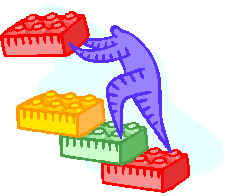VOCABULARY BUILDING

In this unit,
you will be continuing to work with words. This unit focuses on the problems of word usage. Many times writers are presented with
choices between words.
The choices are based on the
meanings intended, the choice of the more appropriate word, or words and expressions that should be avoided completely. Listed below are pairs of words, expressions, etc. that cause many
problems.
![]() Accept,
except -Accept is a verb
that means to receive; except as a verb means to leave
out or to omit; except as a preposition means excluding.
Accept,
except -Accept is a verb
that means to receive; except as a verb means to leave
out or to omit; except as a preposition means excluding.
He will accept the gift. She dropped everything except her purse.
![]() Affect,
effect -Affect is a verb
that means to influence. Effect as a verb means to accomplish; effect as a noun
means the result of something.
Affect,
effect -Affect is a verb
that means to influence. Effect as a verb means to accomplish; effect as a noun
means the result of something.
Will the cold temperatures affect the game? The effects of the march were soon realized.
![]() Among,
between - Among is used to
refer to a group of individuals or things; between is used to
discuss two individuals or things.
Among,
between - Among is used to
refer to a group of individuals or things; between is used to
discuss two individuals or things.
There isn’t one good banana among the bunch. The fight was between the North and the
South.
![]() Beside,
besides-Beside means by the
side of. Besides means in
addition to.
Beside,
besides-Beside means by the
side of. Besides means in
addition to.
The
tray is beside the refrigerator. There
was no one there besides Natalie.
![]() Bring,
take – Bring means
to come carrying something. Take means
to go carrying something. Bring your books to class tomorrow. Take home your projects.
Bring,
take – Bring means
to come carrying something. Take means
to go carrying something. Bring your books to class tomorrow. Take home your projects.
![]() Bust,
busted- Do
not use these words when meaning burst
or break.
The balloon burst. The ball broke the window.
Bust,
busted- Do
not use these words when meaning burst
or break.
The balloon burst. The ball broke the window.
![]() Could
of- Do not use when could
have is intended. That was
the only way it could have happened.
Could
of- Do not use when could
have is intended. That was
the only way it could have happened.
![]() Fewer,
less-Fewer tells how many and is used
with plural words; less tells how much and is used with singular words.
Fewer,
less-Fewer tells how many and is used
with plural words; less tells how much and is used with singular words.
There are fewer students in the advanced class. She has less money than he.
![]() Good,
well –Good is an adjective and should never be used to refer to health. Well is an adverb.
In the case of discussing health, well is used to mean to feel healthy.
Good,
well –Good is an adjective and should never be used to refer to health. Well is an adverb.
In the case of discussing health, well is used to mean to feel healthy.
That was a good movie. He
didn’t do well on the test. Sally doesn’t feel well.